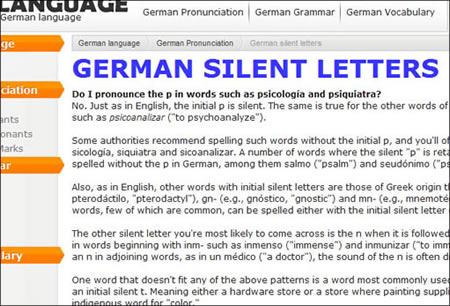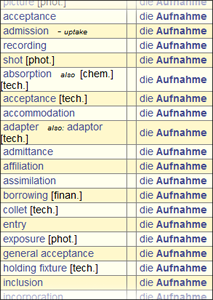Searching for content like this can be a frustrating experience, which is the main reason we created this site. Some of what you’ll find is pure web spam. For example, here’s a screenshot from one site that ranks very high in Google searches:

Actually, there are no silent letters in German. It looks like they’ve taken a description of silent letters in Spanish and done a simple find-and-replace to change the word “Spanish” to “German.” In this case it’s relatively obvious, but in many others it wouldn’t be. It’s scary to think of how far a beginner could be set back by reading this kind of garbage. (Also notice how they've repeated the word "German" all over the top of the page, which is a sleazy trick to fool search engines.)
The next step up from this is “curated” ad farms like About.com. There’s actually some good content on these sites, but they deliberately make it difficult to print or navigate (and bury it in distracting auto-generated links to “related” pages) because they want to maximize the number of times you click. Still, if you’re looking for something specific, your patience will often be rewarded. For example, this list of German obscenities and slang seems to be pretty well done.
(By the way, the former German language guide at About.com has since created his own site at AboutGerman.net, featuring similar content in a much cleaner format.)
The best free sites are the ones where college professors have uploaded some of their own curricula and teaching materials. They often have their own formatting issues, but they’re always ad-free and the content is very high quality. Our favorites are this site from the German department at Dartmouth, and this one from the University of Michigan. If you want something a bit more detailed than our materials, or just a lot more examples of usage, those are two good places to start. But be careful of academic pages like this one that are just sections of out-of-date textbooks.
The most popular German-English online dictionaries, like Leo.org or dict.cc, share a basic problem: they collect definitions based on user submissions, and those definitions are not ordered. So if you enter a common German word, you might get twenty or more English equivalents, like so:

If you already know the word somewhat and you’re trying to interpret it in a particular context, this can be exactly what you need. But if you don’t know it at all, it can be hard to tell which of those English words represent the main meaning and which are less common and/or figurative.
Linguee.com tries to address this problem by including little frequency pie charts next to the different English definitions, which definitely helps. But we’ve noticed a recent falloff in quality in their results in general. They seem to operate by scraping the web for human-translated sites and aggregating definitions from there, which is a clever idea – but, ironically, they may be picking up too many sites that were auto-translated with tools like Linguee in the first place, leading to a negative feedback loop.
The best professionally edited, ordered-definition, free online language dictionary that we’ve found is the one at PONS.eu, and that’s what we would recommend as a first stop. But those others are still great tools, and very useful for certain purposes. For example, dict.cc is good for looking up idiomatic phrases, and leo.org has helpful bulletin boards where users discuss words that are particularly tricky to translate.
If you want to look up different forms of a word, like verb tenses or noun case endings, the best resource is Canoonet. And if you're ready for a German-only dictionary, try Duden or DWDS.
Finally, if you're looking for recommendations for offline language schools and tutors in Germany, or general discussion about living in Germany as a foreigner, start with the forums at Toytown Germany.